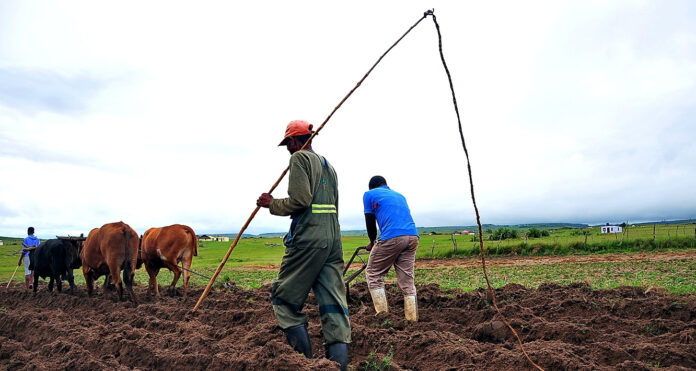The National African Farmers Union (Nafu) believes that the new Expropriation Bill, which President Cyril Ramaphosa signed into law on Thursday, will not benefit and change the lives of black South Africans.
Nafu president Motsepe Matlala believes that Ramaphosa should have instead signed a bill that would have resulted in the government nationalising rural land and giving it to farmers on a 99-year lease.
“What the president has signed when compared to the current needs [of black people] as well as ownership patterns of land currently in South Africa, you’ll see that the Expropriation Bill doesn’t take us very far,” said Matlala.
Matlala made the utterances after Ramaphosa signed the Expropriation Bill into law, repealing the pre-democracy Expropriation Act of 1975.
The signing of the bill into law has come under fire from various quarters, with some already threatening legal action.
The 2017 Land Audit conducted by the Department of Rural Development and Land Reform found that although black South Africans comprised 79% of the population, they had only 1.2% of direct ownership of the country’s rural land.
The audit also revealed that black South Africans owned just 7% of formally registered property in towns and cities.
The majority of the land remained in the hands of whites who made up just 9% of the country’s population but directly owned 23.6% of the country’s rural land and 11.4% of land in towns and cities.
According to Ramaphosa’s spokesperson Vincent Magwenya, the new law sets out how state organs – including local, provincial and national authorities – expropriate land in the public interest for varied reasons that seek, among others, to promote inclusivity and access to natural resources.
The law will, however, bar an authority from expropriating property arbitrarily or for a purpose other than a public purpose or in the public interest. However, Nafu was not pleased by the new law.
“We’re not necessarily 100% happy. I think the president has complied with the old Expropriation Act that talked about expropriation of land for public interest.
“For us, as much as we think it is a starting point, [the new law] is not taking us anywhere,” said Matlala.
“The new legislation doesn’t cover the needs of black farmers at all because they (state authorities) can only expropriate for public interest. There has always been an Act during the National Party rule [apartheid government] of expropriation for public interest. We differ fundamentally with that kind of thing,” said Matlala.
He asserted that the expropriation law should have been amended so that land in rural areas, especially the former homelands, including KwaZulu, Lebowa, KwaNdebele, Gazankulu, Transkei, among others, was expropriated and nationalised for agricultural and livestock purposes. The land he was referring to belongs to traditional leaders.
He also proposed that a new tax be introduced to assist the government to afford to expropriate and nationalise land.
Lobby group AfriForum has lashed out at the move by Ramaphosa, saying with the signing of the Bill into law, the government of national unity had sanctioned a substantial threat to the right to private property.
The ANC has welcomed the enactment of the Bill, saying it “provides a framework to facilitate land reform in the public interest, creating opportunities for economic inclusion and development while ensuring that the rights of property owners are respected.
“It guarantees that expropriation is conducted fairly, justly, and with due process, ensuring alignment with Section 25 of the Constitution, which permits expropriation for a public purpose or in the public interest, subject to just and equitable compensation,” the party said in a statement.
“The ANC views this law as a progressive and transformative tool to advance land reform in ways that enable inclusive economic growth and social cohesion.
“By unlocking access to land, the legislation will promote the development of sustainable human settlements, enhance agricultural productivity for emerging farmers, and enable urban land development to address spatial inequality.
“This is a direct response to the needs of millions of South Africans who have been excluded from land ownership and access to natural resources for far too long.”



